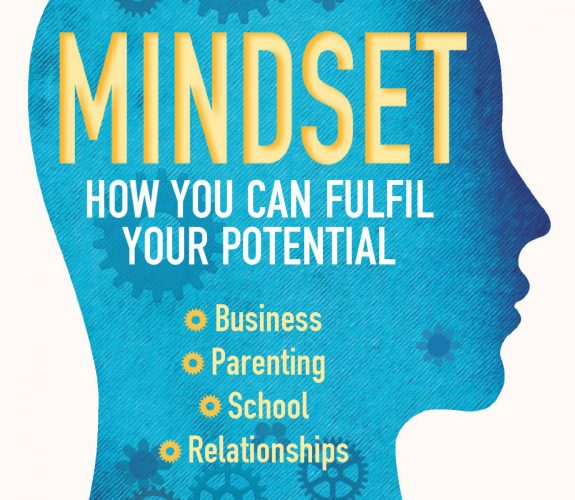MINDSET, How You Can Fulfil Your Potential – Review by Ellie Finney
When I decided to read Carol Dweck’s Mindset: How you can fulfill your potential, I was expecting it to take the form of one of my linguistics textbooks at university; a large volume with long sentences and a glossary of complicated terms. I was not expecting the 250-page paperback that landed on my desk. Although highly instructive and undoubtedly non-fiction, Dweck’s 2006 publication had a light, conversational tone that retained its academic weight and made for an extraordinarily interesting read. She acknowledges her own narrative voice, admitting in her introduction that she has, at times, bent the rules of grammar for “informality and immediacy”. She explains her theory using a plethora of examples and anecdotes, ranging from John McEnroe to her husband, and leaves the reader with no doubt that her theory really does work. When I finished, I felt as though I had been given an important insight into a little-known secret.
Her theory is not difficult to understand, in part because Dweck herself describes it as “a simple idea” but also because of her powers of explanation. In short, mindset can be split into two categories or states of being: one that is fixed and one that leaves room for growth. The fixed mindset is that of an individual who believes people are born with a certain level of intelligence that can never be changed. People with this mindset tend to concentrate on documenting their intelligence rather than challenging their brain to learn new things, and this was found to lead to making excuses and attaching blame, and even cheating, when they were seen to be failing. Their chief concern is looking ‘smart’ and feeling superior to those around them. The growth mindset, on the other hand, stems from people who believe that intelligence is something elastic, something fluid, which can be developed through the continual search for improvement and hard work. To me, one of the most interesting examples that helped define the two was when students were given an unfairly bad grade in a test and told that they could read the papers of the other students in class. Invariably, the students that Dweck had identified as having the growth mindset asked to look at students who did better than themselves, so that they could see how to improve, and students with the fixed mindset chose to look at students who had done worse than themselves, to make themselves feel better. Once the two mindsets have been defined, Dweck goes on to show how the two can halt or improve progress in business, sports and even love, and further to show how they can be used in teaching, parenting and coaching to create willing learners.
The mindsets are so well defined and proven so well by many examples that a reader feels confident in applying the terms to themselves and the people around them. After reading the definition, I would assume that most people analyse their own behaviour to see which mindset they have, as I certainly did. The problem posed by such linear definitions is that people can be on a scale of mindsets, being fixed in some and growth in others, or a mixture of the two. Dweck understands that this must be a common criticism of her ideas as she accepts that people can, be both, but uses polar examples for ease and to avoid unnecessary complication. That said, I do know people who are exceptionally one or the other, be it people who I know or characters from books and TV shows. It seems that the fixed mindset receives a very negative portrayal, as the examples of people with a fixed mindset are particularly detestable for their arrogance and laziness. In the same way, people who have, or have gained, the growth mindset are idolised in the study. It occurred to me, in the examples of young children in schooling, that it must require advanced maturity to think as growth-minded people do, and it amazed me how some children could simply accept failure if they knew they could improve in the future. This goes against the well-known image of children hating to lose or fail.
The most important thing that Dweck touches on when looking at the impact mindset can have on the classroom is that the fixed mindset is so wholly concentrated on grades, whilst the growth is centred on a love of learning that can be developed by anyone, anywhere. If all teachers could praise the struggle of working hard and not the outcome of attaining high grades, schools would turn out more intelligent, rounded people. After all, school is not just there to churn you out with a number around your neck; it is there to develop you as a person. I finished the book with the urge to write down a number of questions I would like to ask Carol Dweck: Has she ever read Hardy’s Jude the Obscure? Has she ever spoken to J.K. Rowling who, when asked in an interview, said she would like to be remembered as “someone who did the best she could with the talent she had” and who gave the 2008 commencement speech at Harvard University on the benefits of failure? To me, Rowling would be the epitome of the growth mindset, yet the book cites few British examples, and understandably so. Reading the book made me wonder what Carol Dweck would think about many problems in life, and I believe she would be a truly fascinating woman to meet.
Written by Ellie Finney on behalf of Osiris Educational
Carol Dweck is one of the world’s leading experts in psychology and motivation research and is currently the Lewis and Virginia Eaton Professor of Psychology at Stanford University.
She will be in England on 2nd, 3rd and 4th July as part of Osiris Educational’s Mindset Conference.
To enquire further about this course, or to book a place, please call 01790 753987 and ask for Ellie
or visit: /conferences/mindsets.html



